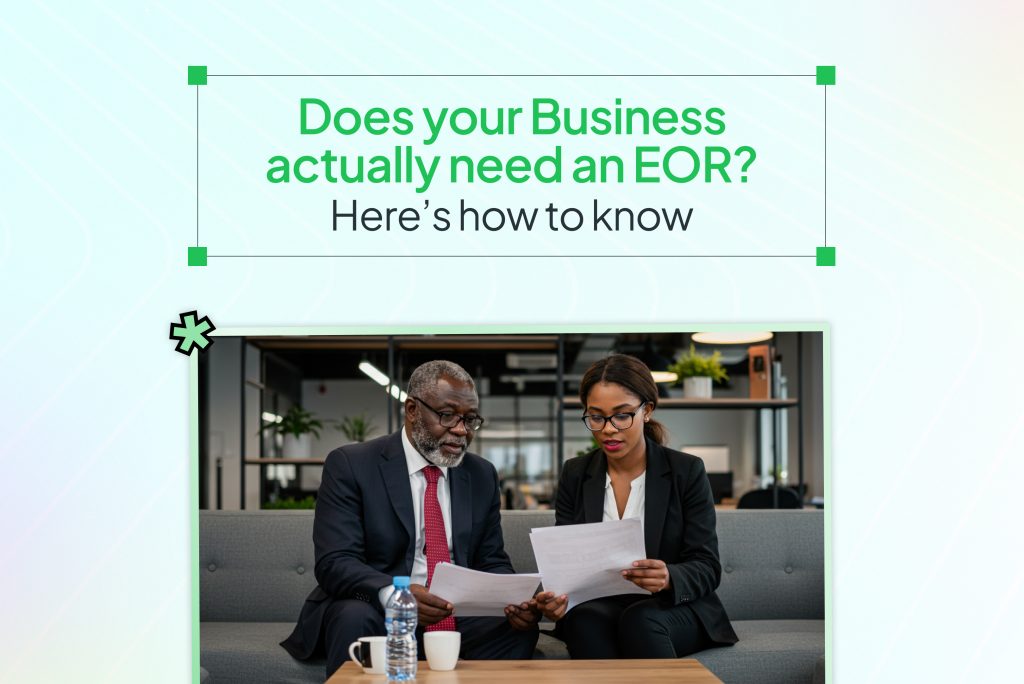
Does your business actually need an EOR? This is a question that most business owners should ask when they need to expand their workforce beyond their base of operations. Turning to employer of record services to hire and manage staff when you need remote talent is usually a great option, but because it is not the only option available, it might not be the best fit for your business needs.
While Salario provides EOR services, our ultimate goal is to ensure that businesses get the right HR and payroll services that meet their needs, assure employee satisfaction, and help drive overall business goals. In our piece today, we will explore a couple of other options besides EOR and discuss when you specifically need an EOR service.
What is an EOR and How Does It Work?
Before answering, Does your business actually need an EOR?, it’s important to understand what an Employer of Record (EOR) really is. An EOR is a third-party service provider that legally employs workers on behalf of your company in a different country or jurisdiction. While you manage the day-to-day tasks and responsibilities of the employee, the EOR handles the legal and administrative side, everything from contracts to compliance.

For businesses exploring new markets or conducting remote hiring, EOR services can serve as a bridge, removing the burden of entity setup and ensuring compliance with local labor laws. Think of it as outsourcing the HR infrastructure in a way that’s fast, reliable, and often more cost-effective than managing everything in-house.
Key Functions of an EOR Service:
- Drafting and managing compliant employment contracts
- Onboarding and offboarding of employees
- Handling payroll processing and payslip generation
- Managing statutory deductions (e.g., taxes, pension, NHF)
- Administering employee benefits
- Ensuring labour law compliance
- Filing mandatory reports to local authorities
- Acting as the legal employer of record
When You DON’T Need an EOR
Small local teams
There are different stages of business expansion, and different goals for businesses. That said, if you intend to run a small team that either solves a local problem or you prefer a local team, then EOR services should not be your first point of call. This does not mean you are closed off to hiring talents outside your area, rather you can look into freelance services or directly reaching out to prospects for contracts that are not burdensome for you or the potential hire.
Established international presence
If you are a global business with an established presence, there is little or no need for you to look into EOR services when expanding employee reach to new jurisdictions. Global brands with established international presence often have the resources and connections needed to establish local entities to carry on business and hire staff without financial backlash.
Except your focus as a large enterprise is not on a specific nation for talent, EOR services might not be your first answer when the need to hire foreign talent arises.
In-house HR/legal expertise

For businesses that already have a legal team versed in the foreign regulations of their potential hire, an EOR may just serve an advisory role rather than an active hiring role. This is often not the case for most companies, as expertise across various countries comes at the steep cost of a large legal team.
Clear Signs You Need an EOR
Does your business actually need an EOR? It’s a valid question, especially when your company is at the crossroads of growth and cross-border hiring. While an employer of record service isn’t for every business, there are clear indicators that suggest it might be the right move. Here are several signs that an EOR service may be exactly what your business needs:
1. You’re hiring in a country where you have no legal entity
If you plan to employ staff in Nigeria or any other foreign market without registering a local company, you’re likely to encounter legal and compliance barriers. An EOR enables you to hire and pay workers legally in that country without the cost or complexity of setting up a local branch or subsidiary.
2. You need to move fast
Global expansion is often time-sensitive. If your growth strategy depends on rapid market entry, an EOR service can help you hire in days instead of months. By handling everything from contracts to onboarding, EORs eliminate the lag associated with traditional HR processes.
3. You want to stay compliant with local laws
Every country has its own employment regulations, tax codes, and statutory obligations. If you’re unfamiliar with Nigerian payroll deductions like PAYE, NHF, or pension contributions, an EOR ensures you don’t run afoul of compliance issues, protecting you from fines, audits, and lawsuits.
4. You’re hiring remote or hybrid teams across borders
Managing a distributed team is no small feat. EORs streamline hiring, HR documentation, and payment processing for remote employees, so you can focus on team performance rather than administrative hassles.
5. You want to avoid permanent establishment risk
Setting up even a small presence in a new country can trigger tax liabilities and regulatory complications. By using an EOR, you can engage workers without being considered to have a “permanent establishment” by local authorities.
6. You lack internal HR/legal capacity for international hires
Small teams often don’t have the in-house expertise to handle overseas employment law. EOR services act as an outsourced legal and HR department, reducing your operational burden.
7. You’re focused on testing a market first
If you’re experimenting with a new region and unsure of long-term presence, an EOR allows you to test the waters without long-term infrastructure commitments. You can scale up or down, without penalty.
If any of these signs resonate, it may be time to explore employer of record services, such as those offered by Salario, which are built specifically to simplify cross-border employment in Nigeria.
Alternative Solutions to EOR Worth Considering
Does your business actually need an EOR? Perhaps not, at least not immediately. While employer of record services offer incredible flexibility, they aren’t the only path forward. Depending on your business model, budget, and long-term vision, you may want to explore other alternatives that still support global hiring and workforce management.
1. Independent Contractors

Hiring freelancers or independent contractors can be a cost-effective way to test a new market. It works well for project-based work, allows for quicker onboarding, and minimizes your tax and benefits responsibilities. However, it also carries the risk of misclassification, particularly in countries like Nigeria, where labor laws are in a state of evolution. If you go this route, legal review is essential.
2. Local Entity Setup
For companies with long-term expansion goals in Nigeria, establishing a local subsidiary may be the most sustainable option. It offers full operational control and permanent brand presence. However, it requires time, capital investment, and a deep understanding of local regulations, which startups and early-stage ventures may not initially have the capacity for.
3. PEO (Professional Employer Organization)
While similar to an EOR, a PEO typically operates in co-employment models within the same country. If your operations are limited to one jurisdiction and you already have a local entity, a PEO may be more suitable for handling HR tasks without taking over as the legal employer.
Ultimately, choosing between these options and an EOR service comes down to scale, speed, and your appetite for risk. At Salario, we help you assess all routes, not just EOR, so you can make an informed decision that prioritizes compliance, agility, and employee well-being.
Conclusion
Choosing the right workforce solution isn’t just a compliance decision; it’s a strategic one. If your business is entering new markets, building remote teams, or hiring internationally without a local entity, then yes, an EOR service could be the smart move. But it’s just one of several options.
At Salario, we go beyond just offering employer-of-record services. We help you determine whether you actually need one or if another model better suits your goals. Still unsure? Let’s talk. Book a demo with our team today and discover how Salario can help your business scale the right way, compliantly, confidently, and cost-effectively.
